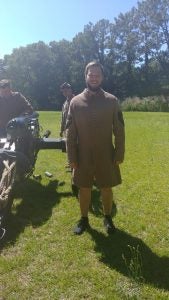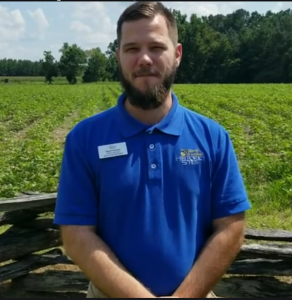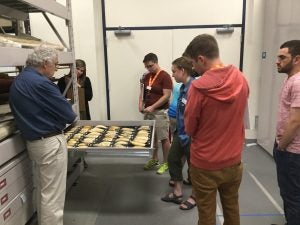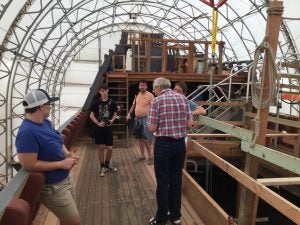Internship Highlights
Over the 2019 summer, two of our graduate students, Trevor Freeman and Kendra Lawrence, interned for different organizations. The Department of History would like to highlight and recognize them for their efforts this summer:


Name:Trevor Freeman
Major: MA in American History
Why did you select this major?
With an undergraduate background in public history, I wanted to further develop my content and historiographical knowledge of American history. I have a long-running passion for history and this degree offers the chance to further my career ambitions within this field.
What made you choose East Carolina University?
I chose ECU because of the specialization of a few current and emeritus professors in the American Revolution, my thesis area. I also like the strong public history reputation of ECU’s history department and its close-knit community among cohorts.
Where did your recent internship take place?
I interned at Bentonville Battlefield State Historic Site over the summer, and currently work there part time.
What were some highlights of your internship?
I enjoyed leading interpretive tours of a Union field hospital and antebellum farm, developing signage for outbuildings, and creating social media videos. The best moments were the chances to engage interested visitors in productive discussions on the Civil War, slavery, the Lost Cause, and monuments. I also relished the chance to learn the ins and outs of state historic sites, to see how they compare to National Park Service units.
Would you recommend participating in an internship to other students who may be interested?
Internships are fantastic ways to test classroom concepts and knowledge in the field. Specifically, internships at historic sites or museums prepare public historians for dealing with the unexpected challenges and opportunities they will face when dealing with the general public and a variety of visitors. I cannot recommend enough the chance to further hone your craft and even get paid for it!
What are your plans after graduation?
I hope to work for national or state historic sites or parks as an interpreter. I also intend to publish further work on Revolutionary War and environmental history topics, perhaps pursuing a Ph.D. in the future.


Name: Kendra Lawrence
Degree/Concentration: History- Maritime Studies
Why did you select this degree?: I have always been fascinated with history and archaeology, even as a young kid. I fell in love with sailing and tall ships as a teen, so when I learned there was a field which combined all of these passions it was a natural fit! While pursuing this degree my goal to work in a museum or tall ship education program to create content that people of all ages, abilities, and backgrounds can connect with.
What made you choose East Carolina University? ECU is one of the few institutions in the country that offer a degree focused on maritime archaeology. Graduates of the program have high rates of employment in the field, and there is a large network of ECU alumni which are invaluable resources all across the globe.
Where did your recent internship take place? Mystic Seaport Museum in Mystic Connecticut.
What were some highlights of your internship? Part of the internship was visiting over a dozen museums around the New England region. These places included the 9/11 Memorial, New Bedford Whaling Museum, the Institute of Contemporary Art in Boston, the Museum of Mathematics, and many smaller institutions. We got to see behind the scenes in many places and look through the collections that the general public might never get to see. Being based at Mystic Seaport Museum also gave me the opportunity to sail small boats, climb the rigging of a tall ship, and try rowing a whaleboat.
Would you recommend participating in an internship to other students who may be interested? This internship taught me so much about how museums function. We were exposed to nearly all aspects of museum operations including collections, exhibits, strategic planning, granting, and daily operations. You are given opportunities to have frank discussions with experienced museum professionals about their work, background, and how they see museums functioning as places of learning, discovery, community, and change.
What are your plans after graduation? Likely moving to New England or the Great Lakes region to pursue work in the museum field or other related maritime industries.
The Department would also like to recognize the effort of its past graduate students. Their efforts can be seen on the May Museum’s website. This was a collaborative effort between ECU history students under the guidance of Dr. Prokopowicz.